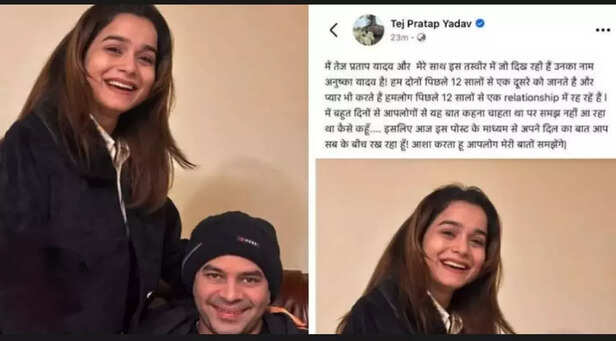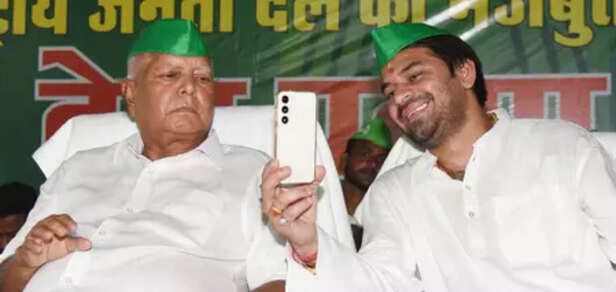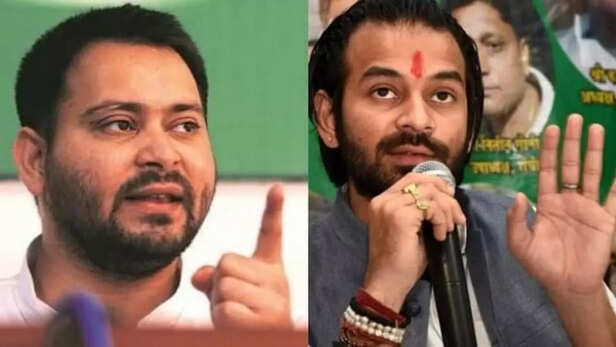Bihar's Pre-Election Political Gameplay—Lalu Yadav Expels Elder Son Tej Pratap Yadav from Party and 'Family'
Ankit Gupta | May 25, 2025, 20:51 IST
The controversy arose after Tej Pratap posted on Facebook about being in a 12-year relationship with a woman named Anushka Yadav. He later claimed that his account had been hacked. Lalu Prasad stated that such conduct was not in accordance with the family's values and traditions, emphasizing that Tej Pratap would have no role in either the party or the family moving forward.
In a dramatic yet telling episode of political and familial rupture, Rashtriya Janata Dal (RJD) chief Lalu Prasad Yadav recently expelled his elder son, Tej Pratap Yadav, from the party for six years and publicly disowned him from the family. This unprecedented move comes amidst rising political heat in Bihar as elections approach. Officially, the expulsion was attributed to Tej Pratap's "irresponsible behavior" and deviation from party values. But in reality, it reflects a deeper crisis not just within the Yadav family, but within the RJD’s current political imagination.
Tej Pratap, the elder son of the legendary Lalu Prasad, has always been a flamboyant, unpredictable, yet endearing presence in the political theatre of Bihar. From dressing up as Lord Krishna and Shiva to making spontaneous, heartfelt speeches, he has always defied the mould of the typical politician. In many ways, he is a throwback to the raw, emotionally charged populism that once powered Lalu’s mass appeal.

This expulsion, occurring just before the election season, is undoubtedly timed for political effect. Lalu's official statement accused Tej Pratap of behavior contrary to the "values and ideals" of the RJD, especially in light of the recent social media storm. Tej Pratap posted a photo of himself with a woman named Anushka Yadav, claiming a 12-year relationship. This, while he is in the middle of a divorce proceeding with Aishwarya Rai, predictably created a media circus. Though Tej Pratap later claimed his account was hacked, the damage was done.
Lalu's move to disown him seems aimed at insulating the party from further scandal. His decision signals an attempt to preserve a clean image, possibly to consolidate Tejashwi Yadav’s leadership and position the RJD as a more modern, strategic force. But in doing so, Lalu may have misjudged the emotional and political undercurrents.

Tej Pratap is often dismissed by political pundits as a clownish figure. But such simplification overlooks his deep resonance with a section of Bihar’s electorate. He is not a polished statesman, but he is accessible, emotional, and unpredictable in a way that endears him to many. His antics—riding horses, distributing laddoos, offering prayers—are not just gimmicks; they are a form of political theatre that speaks to the cultural heart of Bihar.
More importantly, Tej Pratap has positioned himself as a patriot and spiritual seeker. His social media is filled with symbolic content—tributes to Lord Krishna, nationalistic music, references to Dharma and tradition. These elements resonate with a demographic that is religiously and culturally inclined, yet politically disillusioned. In an era when voters are yearning for authenticity, his rawness stands out.

Tejashwi Yadav, the younger son, is RJD’s crown prince in every practical sense. Calm, strategic, and articulate, he appeals to the urban middle class, students, and opposition alliances. His rise has been methodical and diplomatic.
But Tejashwi’s style also runs the risk of being too sanitized for a party that built its legacy on raw emotional connection. Lalu Prasad’s original appeal was never technocratic. It was rooted in folklore, drama, and a sense of resistance. Tej Pratap, for all his flaws, is the living heir to that political style. He speaks in metaphors, acts on instinct, and carries the spiritual-cultural idiom that once defined the RJD's mass base.
The comparison is not just between two brothers, but two ideologies: one of urban pragmatism, the other of rural romanticism. In a state like Bihar, the latter still holds potent political currency.

Tej Pratap understands the value of staying in the limelight. His dramatic moves often go viral, whether it’s dressing as a deity, visiting temples, or speaking in riddles. This media-savviness—although often ridiculed—keeps him in public consciousness. In today’s politics, visibility often trumps substance.
Contrast that with Tejashwi’s relatively subdued public persona, and it’s easy to see why Tej Pratap, even in exile, continues to command attention. He may not have administrative experience, but he has narrative power. He tells stories, projects emotions, and creates moments.
In an age where politics is as much about spectacle as policy, Tej Pratap’s methods could have been leveraged rather than shunned.
Lalu Prasad’s decision, while appearing firm, also reveals the anxiety of a patriarch trying to manage a legacy. Having built a political empire on the strength of identity and emotion, he now seeks to transition it into a new era of professionalism and alliance-building. But in sidelining Tej Pratap, he may be cutting off a vital organ of his own political body.
This isn’t just about one son's misstep. It’s about an ideological shift. By disowning the flamboyant, erratic, but deeply rooted elder son, Lalu is trying to rebrand RJD as a party of discipline, modernity, and electoral caution. But this strategy risks alienating the emotional core of his base.
Tej Pratap Yadav’s political future is uncertain, but far from over. Estranged from his party and family, he now has the rare opportunity to reinvent himself—either as an independent voice or as the spiritual-cultural icon he aspires to be.
History is full of political outcasts who returned stronger. If Tej Pratap learns to channel his energy, discipline his instincts, and build a core team, he could emerge not just as a challenger to his brother, but as a symbol of the emotional politics that many still crave.
The story of Tej Pratap Yadav is not just about a family feud. It is about the soul of a political party trying to reconcile its past with its future. In rejecting its most colourful heir, the RJD may have silenced a liability—or squandered an asset it never fully understood.
Either way, the drama has only just begun.
Tej Pratap, the elder son of the legendary Lalu Prasad, has always been a flamboyant, unpredictable, yet endearing presence in the political theatre of Bihar. From dressing up as Lord Krishna and Shiva to making spontaneous, heartfelt speeches, he has always defied the mould of the typical politician. In many ways, he is a throwback to the raw, emotionally charged populism that once powered Lalu’s mass appeal.
The Drama of Expulsion

Politics Meets Family Feud
This expulsion, occurring just before the election season, is undoubtedly timed for political effect. Lalu's official statement accused Tej Pratap of behavior contrary to the "values and ideals" of the RJD, especially in light of the recent social media storm. Tej Pratap posted a photo of himself with a woman named Anushka Yadav, claiming a 12-year relationship. This, while he is in the middle of a divorce proceeding with Aishwarya Rai, predictably created a media circus. Though Tej Pratap later claimed his account was hacked, the damage was done.
Lalu's move to disown him seems aimed at insulating the party from further scandal. His decision signals an attempt to preserve a clean image, possibly to consolidate Tejashwi Yadav’s leadership and position the RJD as a more modern, strategic force. But in doing so, Lalu may have misjudged the emotional and political undercurrents.
A Mass Leader in Waiting?

Lalu Prasad Yadav expels son Tej Pratap from RJD for six years for ‘immoral behaviour’ (Lead)
( Image credit : IANS )
Tej Pratap is often dismissed by political pundits as a clownish figure. But such simplification overlooks his deep resonance with a section of Bihar’s electorate. He is not a polished statesman, but he is accessible, emotional, and unpredictable in a way that endears him to many. His antics—riding horses, distributing laddoos, offering prayers—are not just gimmicks; they are a form of political theatre that speaks to the cultural heart of Bihar.
More importantly, Tej Pratap has positioned himself as a patriot and spiritual seeker. His social media is filled with symbolic content—tributes to Lord Krishna, nationalistic music, references to Dharma and tradition. These elements resonate with a demographic that is religiously and culturally inclined, yet politically disillusioned. In an era when voters are yearning for authenticity, his rawness stands out.
Tejashwi-Tapasya Model vs. Tej Pratap’s Bhakti

Indentity Crisis Could lead to feud in the Party
Tejashwi Yadav, the younger son, is RJD’s crown prince in every practical sense. Calm, strategic, and articulate, he appeals to the urban middle class, students, and opposition alliances. His rise has been methodical and diplomatic.
But Tejashwi’s style also runs the risk of being too sanitized for a party that built its legacy on raw emotional connection. Lalu Prasad’s original appeal was never technocratic. It was rooted in folklore, drama, and a sense of resistance. Tej Pratap, for all his flaws, is the living heir to that political style. He speaks in metaphors, acts on instinct, and carries the spiritual-cultural idiom that once defined the RJD's mass base.
The comparison is not just between two brothers, but two ideologies: one of urban pragmatism, the other of rural romanticism. In a state like Bihar, the latter still holds potent political currency.
The Media-Social Media Factor

Tej Pratap Yadav offers to serve nation amid Indo-Pak tensions
( Image credit : ANI )
Tej Pratap understands the value of staying in the limelight. His dramatic moves often go viral, whether it’s dressing as a deity, visiting temples, or speaking in riddles. This media-savviness—although often ridiculed—keeps him in public consciousness. In today’s politics, visibility often trumps substance.
Contrast that with Tejashwi’s relatively subdued public persona, and it’s easy to see why Tej Pratap, even in exile, continues to command attention. He may not have administrative experience, but he has narrative power. He tells stories, projects emotions, and creates moments.
In an age where politics is as much about spectacle as policy, Tej Pratap’s methods could have been leveraged rather than shunned.
The Patriarch’s Gamble
This isn’t just about one son's misstep. It’s about an ideological shift. By disowning the flamboyant, erratic, but deeply rooted elder son, Lalu is trying to rebrand RJD as a party of discipline, modernity, and electoral caution. But this strategy risks alienating the emotional core of his base.
The Phoenix in Exile?
History is full of political outcasts who returned stronger. If Tej Pratap learns to channel his energy, discipline his instincts, and build a core team, he could emerge not just as a challenger to his brother, but as a symbol of the emotional politics that many still crave.
The story of Tej Pratap Yadav is not just about a family feud. It is about the soul of a political party trying to reconcile its past with its future. In rejecting its most colourful heir, the RJD may have silenced a liability—or squandered an asset it never fully understood.
Either way, the drama has only just begun.
